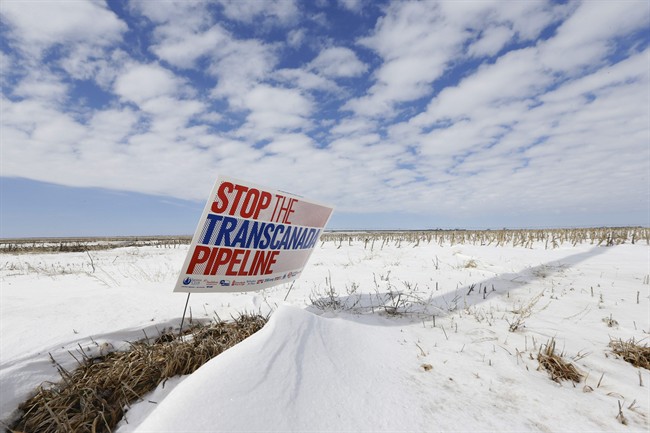WASHINGTON – The Keystone XL pipeline decision now rests in President Barack Obama’s hands, with a Nebraska court clearing an obstacle that has delayed a decision following years of debate over the Canadian oil project.

Obama had been saying for months that he couldn’t complete a review until Nebraska’s Supreme Court ruled in a dispute over the route – and the verdict is now in.
Friday’s decision produced a rare moment of unity in this passionate, protracted debate that has transformed a 36-inch oil pipe from Alberta to Texas into a proxy battle over America’s commitment to fighting climate change.
READ MORE: Prentice to lobby Washington about Keystone XL pipeline
Both sides appear to agree now: After six years, the issue rests with the president.
“It still boils down to President Obama,” said Nebraska farmer Randy Thompson, who led the court fight against the project.
“He holds the hammer on this issue – and hopefully he’ll come down in our favour.”
Way on the other end of this bitter dispute, a Republican senator actively pushing the project through the U.S. Congress concurred that a decision is nigh: “President Obama has no excuse to further delay the Keystone XL pipeline project.”
READ MORE: White House issues veto threat on Keystone pipeline bill
The Canadian government said a similar thing in more diplomatic language. In a statement, Natural Resources Minister Greg Rickford welcomed the ruling and said it cleared the way for the State Department to conclude its previously delayed review – a process ultimately controlled by the president.
Friday’s judgment by Nebraska’s state supreme court came as a relief to pipeline-backers.
By the narrowest of margins, a seven-judge panel dislodged a major impediment to the project. It nullified a lower court decision that said the pipeline’s route through Nebraska was created unconstitutionally.
WATCH: The new Republican-dominated Congress immediately set its sights on Keystone XL. Tom Vernon looks at the ongoing debate and how the company and Alberta are responding.
Oil-friendly politicians in the state had been accused of circumventing the normal arm’s-length process to produce a law that gave TransCanada Corp. eminent-domain power like other utilities – in other words, it had the right to force through the property of hostile landowners.
The decision came with a bizarre twist.
None of the seven judges Friday expressed agreement with the process used by the pipeline company. Four called it unconstitutional. But, in Nebraska, it requires a five-vote supermajority to declare a state law unconstitutional and three of judges sat out the decision.
So the pipeline lost 4-0 – and still won.
Jane Kleeb, the political activist who organized the minority of landowners opposing the project and helped make their cause a national political issue, compared her side to a boxer – it had its nose bloodied Friday, but was still standing.
Thompson, one of the first farmers to oppose the project, was certainly swinging Friday.
“It’s just a ridiculous idea that a foreign corporation can have power of eminent domain to start with. But then the fact that our governor and our legislature actually granted a foreign corporation the power of eminent domain before they even had a permit to build their project in the United States – this is what was totally outrageous to us, and why we filed this lawsuit in the first place,” he said.
“And I think anyone that owns property in the United States should be outraged… The fact that we have foreign corporations that can use eminent domain against American citizens for their own private use and gain, we need to address this – not only in Nebraska but as a nation.”
Opponents hinted at other potential lawsuits. But they conceded that they couldn’t push this case any further to the U.S. Supreme Court because it involved a state constitutional issue.
The end of the Nebraska case means the president can now wrap up his administration’s review into the project, perhaps within several weeks.
Separately, Obama could also choose to sign a law that’s widely expected to pass Congress as the first order of business in this new session. But that legislative route appears unlikely, as Obama has argued that the process doesn’t belong to lawmakers and has declared he’ll veto pipeline legislation.
Keystone bills are now making their way through both houses of the U.S. Congress. One easily passed the House of Representatives on Friday, and another could undergo a series of amendments in the Senate as members stick their own priorities into the bill to increase its chances of adoption.
Project proponents hope that the lawmakers pack it with enough of the president’s own priorities to tempt him into backing down on his unequivocal veto threat.
Calgary-based TransCanada Corp. (TSX:TRP) has been waiting for more than six years for a U.S. permit to build the $8-billion pipeline, which has become a major irritant in Canada-U.S. relations.
The pipeline would connect to an existing TransCanada system, enabling some 830,000 barrels of crude per day, mostly from Alberta, to more directly reach the lucrative Gulf Coast market by cutting diagonally from the Saskatchewan-Montana border to Steele City, Neb.
Editor’s note: An initial version of this story suggested the court ruled the plaintiffs did not have legal standing. The inaccurate information has since been removed.




Comments